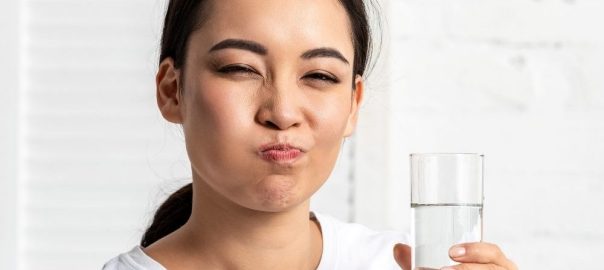‘Rinse’ is one of the daily 4 habits recommended for optimal oral health. With October being National Dental Hygiene Month, we are going through each of the habits, how to do them correctly, and tips to make them the most effective. Today, we are focusing on how important it is to rinse your mouth as part of the daily oral care routine of: Brush, Floss, Rinse and Chew!
What Does it Mean to Rinse?
Adding a mouthwash to your daily oral care routine adds additional protection against gum disease. Your teeth are cared for through brushing and flossing, and yet they only make up half of your mouth. Your tongue and mouth’s soft tissue can also hold onto bacteria, and rinsing with an ADA approved mouthwash helps eliminate it.
What Type of Rinse is Best?
The American Dental Association recommends using alcohol-free mouthwashes to rinse your mouth starting no earlier than age six. Why age six? Because children under the age of six are more likely to swallow the mouthwash.
In general, there are two types of mouthwash: cosmetic and therapeutic. Cosmetic mouthwashes offer a temporary benefit of reducing bad breath. Therapeutic mouthwashes, however, offer many more benefits and are what we recommend as part of your oral health care. These mouthwashes:
- Kill bacteria
- Reduce plaque (bacteria on the tooth’s surface including between teeth)
- Freshen breath
- Reduce your risk of cavities
- Can contain fluoride to reduce tooth decay
- Reduce gingivitis (early gum disease)
- Slow tartar growth
- Sometimes require a prescription
When you choose an over-the-counter product to rinse your mouth, make sure it has the American Dental Association’s seal of approval which confirms the product has been tested, safe and effective for oral health.
Bad Breath and Mouth Rinses. Will it prevent bad breath if you rinse your mouth? It can help. Of course, good oral hygiene is the key, but there are a few other causes of, and solutions to bad breath.
Bacteria. Bacteria lives in your mouth naturally and using a mouth wash that is ADA approved will kill those bacteria and freshen your breath. Brushing your tongue as part of your regular routine can also eliminate the bacteria.
Gum Disease. Periodontal disease, or gum disease, is the build-up of bacteria in your mouth that is beyond being managed with just the typical daily oral care. Seeing a dentist for treatment can help improve bad breath due to gum disease.
The Foods You Eat. There are several foods that can contribute to bad breath. Thankfully these are usually temporary and can be resolved through chewing sugar-free gum, sucking on a mint, brushing your teeth, or rinsing with a mouthwash.
Using Tobacco. Tobacco users have twice the risk for gum disease as nonsmokers, and may not respond as well to treatment. Gum disease causes bad breath, and smoking and chewing tobacco puts you at increased risk for several health problems. Consider reducing or eliminating tobacco use and see your dentist for further recommendations.
Saliva constantly washes out your mouth, and if you don’t have enough, it results in dry mouth and bad breath. Your dry mouth can also be caused by mouth breathing, medications you are taking and even dehydration. Drink water and talk to your dentist about specific products to rinse your mouth that could work for you.
Who knew there were so many reasons to add rinsing to your everyday routine?
Whether adult or child, establishing and maintaining healthy oral habits including regular brushing, flossing, rinsing, and chewing is important. Seeing a dental health practitioner at least twice a year is part of that routine as well. Find your next dentist at Perfect Teeth today!

